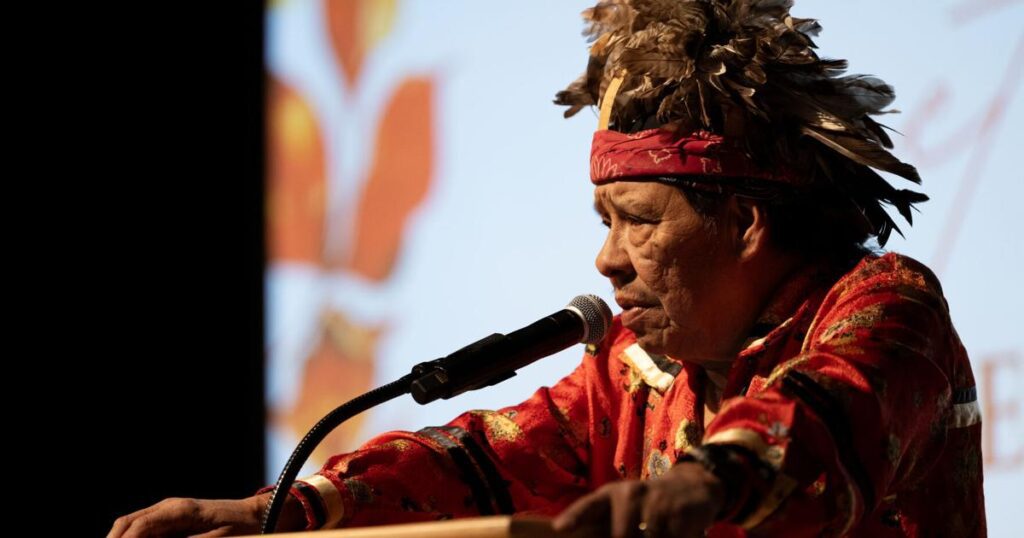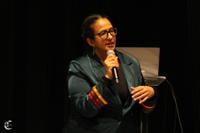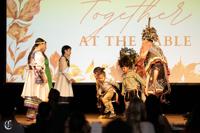Penn State’s Indigenous Peoples’ Student Association (IPSA) is using Native American Heritage Month to increase visibility for Indigenous students on campus and highlight how national rhetoric and federal policies continue to affect Native communities.
Ayla Orona said she joined the organization because of the lack of Indigenous representation at Penn State.
“Being a Native American student at Penn State and just knowing the Native American population is so little here … joining gave me an opportunity to provide light on the Native American community,” Orona, a third-year studying data science, said.
Orna, IPSA’s president, said campus recognition of Native American Heritage Month is important because the culture can often be undermined and unknown amongst the widespread population.
“A lot of people assume that our population is not here anymore,” Orona said. “So many people don’t know about Native Americans, their culture or even just history in general.”
As part of this year’s programming, IPSA brought in Indigenous Chef Lorinda John for a community dinner. Orona said the event drew strong attendance and offered both cultural education and community building. John also hosted a dreamcatcher workshop.

Indigenous chef Lorinda John speaks during her keynote speech “Reclaiming Roots: Indigenous Food Sustainability” in the Flex Theater in the HUB-Robeson Center on Tuesday, Nov. 11, 2025 in University Park, Pa.
The organization’s leaders said these events aim to challenge common misconceptions, including the belief that Indigenous people are rare or absent in contemporary society.
“Once you mention you are Native American, a lot of people’s first response is, ‘Oh, you’re the first Native American I’ve ever met,’” Orona said. “People don’t even realize that Native American people still exist.”
IPSA’s visibility has improved in recent years, according to Orona. She said the university’s addition of an Indigenous faculty advisor and increased engagement from the Indigenous Faculty and Staff Alliance.
“Including an Indigenous faculty advisor was definitely a very strong move,” she said.
She said she credits advisor Jacinta Garcia with helping Indigenous students connect, attend events and reach out to prospective Native students.
“Highlighting Indigenous communities has really increased just by seeing it in my past three years,” Orona said.
Orona said that IPSA members saw the impact of national rhetoric and federal policy decisions on Indigenous communities, including those from the Trump administration.
“It has especially come through the type of language that is spoken,” Orona said. “Policies already undermining communities that are really challenged can definitely increase challenges within Native American reservations.”
She said recently, there have been a number of cuts to the Center for Disease Control and Prevention grants that benefit Native American reservations.
Other IPSA officers emphasized the need for Penn State to acknowledge Indigenous history, particularly as a land-grant institution.
Laenee McCoy said it’s important to celebrate Native American Heritage Month because Indigenous people are “still here and their culture is still rich and alive.”

The George family performs traditional Native American dances at The 5th Annual Together at the Table event in Heritage Hall on Thursday, Nov. 13, 2025 in University Park, Pa.
McCoy, a third-year studying anthropology and art history, said Penn State is still profiting off of the relocation and displacement of Indigenous communities. The history of this isn’t well known but should be, according to McCoy.
“We want to provide a safe place for Indigenous students, faculty and allies to come together and learn,” McCoy,the secretary of IPSA, said. “This is especially important when kids come from reservations as they can have a hard time acclimating. It’s nice for them to know they have people here that will support them.”
Sienna Strong-Jones said cultural celebration is necessary in the face of “cultural erasure.”
“It’s important that we understand the history and recognize how our culture has evolved over time in such a beautiful way,” Strong-Jones, a fifth-year doctoral candidate studying human development and family studies and IPSA’s vice president, said.
Looking ahead, Orona said IPSA plans to continue hosting cultural craft workshops, including beadwork and dreamcatcher activities. She said the group’s broader mission is to support Indigenous students on campus while spotlighting Indigenous cultures globally.
“We want to show we are one and that we can all help each other in the end,” she said.
MORE NEWS COVERAGE



